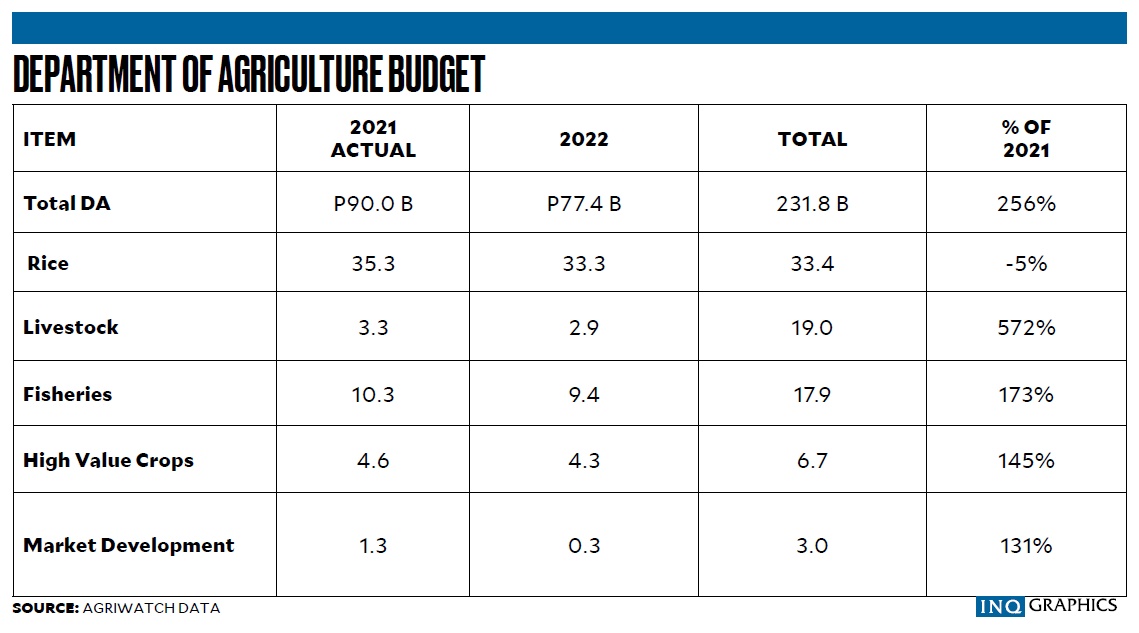No money, no honey for agriculture
Despite the game-changing recommendations from the May 14 National Farmer-Fisherfolk Congress and the May 18-19 National Food Security Summit, the feeling of success may be short-lived.
That is if the Department of Budget and Management (DBM) will not approve any money for the implementation of these recommendations.
On June 14, the public private Philippine Council of Agriculture and Food endorsed the Department of Agriculture’s (DA) proposed (two-tiered) 2022 budget to the DBM.
Tier 1 covers ongoing 2021 programs of the same scope and quantity. Tier 2 contains new programs and expansion of existing ones. The DBM disapproved many of the DA initiatives under Tier 2.
For 2020 and 2021, the DBM approved a DA budget of P71.8 billion and P86.3 billion, respectively. This was only 22 percent and 30 percent of what the DA sought.
Common purpose
A joint statement signed by 95 farmer-fisherfolk organizations asked for a major change in agriculture direction. A farmer leader said: “We are treated unfairly because we do not have a level playing field with foreign competitors. Other countries give their farmers subsidies and support services, but not us. When our supply falters, the immediate response is to cut tariff rates drastically to encourage more importation. Nothing is done to give us the necessary support services to enable us to compete.” It was signed at the National Farmer-Fisherfolk Congress, along with specific recommendations. President Duterte also called a Food Security Summit headed by Agriculture Secretary William Dar.
To the credit of the DA, the final Summit document included many of the recommendations from the Farmer-Fisherfolk Congress.
So then all is fine? Not so fast. If these recommendations are not funded, they will then be just “much ado about nothing.” The missing element is DBM’s endorsement for funding.
In the past, the DBM did not approve the majority of the DA’s budget proposals. For 2020 and 2021, DBM approved P71.8 billion and P86.3 billion, which were only 22 percent and 30 percent of what the DA had asked for. For both years, it got less than 2 percent of the national budget, even though agriculture contributes directly and indirectly 35 percent of our gross domestic product.
This year should see a different outcome, since there were better recommendations from the Summit. The DBM may not have known these recommendations when it came up with the numbers (see table).
Analysis
From the table, Tier 1 is the only component the DBM is almost certain to approve. Tier 2 has to be argued credibly.
It should be noted that the process this year is very different. The private sector participated more extensively than before. There are now new “story lines” for each major budget item in Tier 2, with cost-benefit analysis to determine priorities. With the private sector more involved, there is better justification for each item in Tier 2.
Referring to the table above, if Tier 2 is ignored, the following will likely happen: the African swine fever will continue to create havoc with more backyard raisers losing their livelihood; the potential of fisheries in mariculture and unproductive fishponds will be lost; the high value crops not interspersed in our outmoded monocrop rice, coconut and corn systems will condemn our farmers to perpetual poverty, and the missing market information system mandated by the 1995 Agrifisheries and Modernization Act will continue to make us incapable of proper planning and implementation. Our continued ignorance of the global market environment is largely why we are the agriculture laggard in the Asean. The DBM should be informed of our desperate agriculture situation, and the Summit recommendations. An effective way is for the DBM to modify its policy of not allowing the private sector to join their DA partners in explaining the cost-benefit of each Tier 2 budget item. Just as our trade representatives now bring their private sector partners to international negotiations, agriculture budget officials must also be allowed to bring their private sector partners to give credible quantified input with examples. If this is not allowed and the agriculture proposals lack specificity, we may fail. But with the DBM support, the agriculture transformation will begin, and the desired honey and happiness will finally flow into agriculture. INQ
The author is Agriwatch chair, former Secretary of Presidential programs and projects and former undersecretary of DA and DTI. Contact is Agriwatch_phil@yahoo.com.


